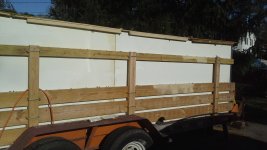jb1390
Gold Member
Well, yes, but/and the finer pitch has a more gradual advance hence more mechanical advantage. The same torque will give a slightly higher clamp force. So the fine pitch increases the clamp directly. And then by the fact of larger root diameter it can take even more torque.
larry
The mechanical advantage hardly comes into play at all when comparing fine and coarse pitch bolts. The vast majority of the torque applied to a fastener is to overcome friction, mostly under the head of the bolt, and also along the threads. Only 10-15% of the torque of a bolt actually goes to applying preload. The change in preload between coarse and fine pitch assuming a constant torque value is negligible.
